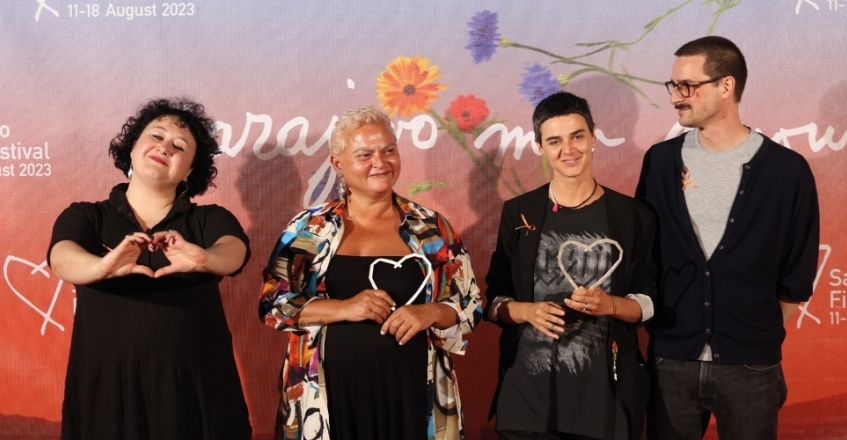Objave
The sexual awakening of Georgian cinematography
What is love? What is happiness? What is independence? These are the questions that Georgian director Elena Naveriani explores in the film "Blackbird Blackbird Blackberry", the story of Etero, a woman living in a small village in Georgia who has never wanted a husband. The film won the Heart of Sarajevo for Best Feature Film at the 29th Sarajevo Film Festival.
The sexual awakening of a 48-year-old virgin isn’t something that we usually see on the big screen. What attracted you to this story?
The peculiarity of Etero doesn't only lie in her sexual awakening but also in her complexity how she perceives the world around her and how she deals with it. What was inspiring to me is her personality, her aspiration towards freedom, and her intuitive disobedience about the predetermined role assigned to females in society. What is important and empowering in her story is that our society often operates on assumptions, one of which is that female sexuality diminishes after a certain age. However, Etero, like all other people, retains her own sexuality, and she embraces, loves, and enjoys it despite being considered “outdated” by the society around her. This aspect of the story is incredibly powerful.
How much was Tamta Melashvili, the author of novel “Blackbird Blackbird Blackberry”, involved in the process of making the film?
From the very first moment I had the idea to make a film based on the novel, and when I discussed it with Tamta, it was clear that she had no intention on interfering with the writing process. Tamta told me, “I have finished my Etero; she exists on the paper. I can't get involved in your universe. So go for it…" This trust was very precious to me. Having this freedom was essential as it allowed me to work on the project with my own vision and find my unique perspective on Etero and how to tell her story.
What were the biggest challenges you encountered whilst adapting the novel?
One of the biggest challenges was making choices. The text itself is very rich and narrated in the first person, presenting a monologue that travels through different timelines - past, present, childhood, and dreams, all intricately intertwined. Initially, the most significant challenge was deciding which aspect to focus on: the family, neighbours, past experiences, or traumas? There were so many elements contributing to and shaping Eater's character. It was a difficult process to carefully extract key elements from the text and later imbue our own accents and interpretations while remaining true to the essence of the original novel.
What did you see in the leading actress Eka Chavleishvili that made you believe she would be perfect for the role?
Eka was the perfect listener: she understood and shared the same heartbeat as I did. She had to star in the film, and she did a fantastic job.
How important was it for you to use an intimacy coordinator during the shooting of sex scenes?
It is crucial to acknowledge that intimate scenes require a different approach in acting. What our intimacy coordinator Liana Norton did with the actors over the few days was magical and provided a very interesting experience, both for them and for me. Her technique facilitated the actors to reconsider their movements. The process involved obtaining consent, becoming familiar with each other's bodies, designing movements, and understanding the reasons and intentions behind every movement in the entire dance (which eventually becomes the love scene). This process led to a profound respect for each other's bodies and a better understanding of each other's sensibilities. The actors gained more confidence and trust in each other and in the filmmaking process. As a result, we had a fully trustful working environment throughout the three months of filming. It is essential to recognize how to behave and respect the delicate moments on the set, as actors are in a much more vulnerable situation than the people behind the camera.
Why do you think sexuality is so closely connected to women's freedom?
It concerns everybody's freedom.
You find it easy to show real bodies as they are. Why do you think that it shocks viewers more than the glamorized bodies that we usually see on the screen?
It's not done to shock anybody; there was never a thought of it. In the end, there is nothing shocking about seeing bodies that are outside conventional shapes and forms. If someone is shocked, it's their own problem, because if you look around, we all have different bodies, shapes, colours, and standards. The ideals offered by the system only apply to very few people in society. Everybody has the legitimacy to exist.
You have been living in Switzerland for more than a decade. Do you believe that this outsider view provides you with a clearer perspective on Georgian society?
I don't believe that merely moving from one place to another automatically grants you a clearer view of society. Society is much more complex than simply gaining distance and looking at it from different perspectives. Living in Switzerland has given me a slightly different perspective on myself and the culture I grew up in and currently live in.
Is it easier for you to make films by living in Switzerland? Do you think that in Georgia you would have less opportunities?
It's never easy to make films, anywhere… However, there is a significant difference in the current state of Georgian cinema. Filmmakers and films that address actual political and social issues from a critical point of view face censorship. The institution is governed by individuals who are unqualified and exhibit bias. The government actively works to suppress any critical viewpoints in various cultural spheres. Many talented and unique Georgian filmmakers today find themselves with fewer opportunities to create films that challenge the interests of the Georgian government. In contrast, I would say that in my second home, Switzerland, it is comparatively easier to make films.
Josip Jurčić






